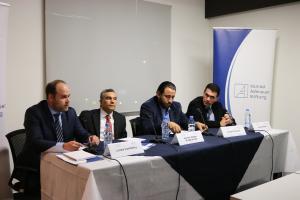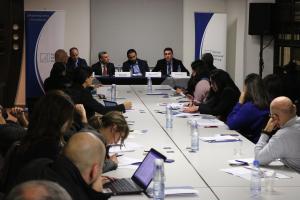Iraq at a Crossroads – Political Consolidation or Further Disintegration? - European and International Cooperation
Event Reports
The panelists were Harith Hasan Al-Qarawee from the Rafik Hariri Center for the Middle East of the Atlantic Council and Akeel Abbas from the American University of Sulaymaniyah. After welcoming words by Julien Courson from MEIRSS and Lucas Lamberty from the KAS Syria/Iraq office, Al-Qarawee argued that the upcoming elections would likely maintain the status quo of Iraqi politics. This is especially due to the sectarian election strategies of the competing parties and the Iraqi process of government formation, which is usually marked by the establishment of large coalitions and the distribution of ministries to many different parties. He then summarized the challenges of Iraq and emphasized that after the years of ISIS rule, and considering the current conflict between Baghdad and Erbil, it is important to create new economic perspectives in order to stabilize the country.
Abbas focused on the tensions in the Kurdistan Region of Iraq and the Kurdish parties and highlighted that the independence referendum in September 2017 was behind closed doors opposed by many Kurds. He explained that the conflict between the three largest Kurdish parties – the Kurdistan Democratic Party, the Patriotic Union of Kurdistan and the Gorran Movement – escalated over the struggle with the Iraqi government for Kirkuk in October 2017. Abbas explained that the increasing differences between the parties have weakened the Kurds’ position towards the Iraqi central government. However, with the upcoming elections, new Kurdish parties could win political influence, which would induce a fundamental change of the relations between Baghdad and the Iraqi Kurds.
The attending audience included embassy staff, regional experts, members of the Lebanese Forces party and students, who all contributed actively to the subsequent discussion.
Topics
About this series
The Konrad-Adenauer-Stiftung, its educational institutions, centres and foreign offices, offer several thousand events on various subjects each year. We provide up to date and exclusive reports on selected conferences, events and symposia at www.kas.de. In addition to a summary of the contents, you can also find additional material such as pictures, speeches, videos or audio clips.




